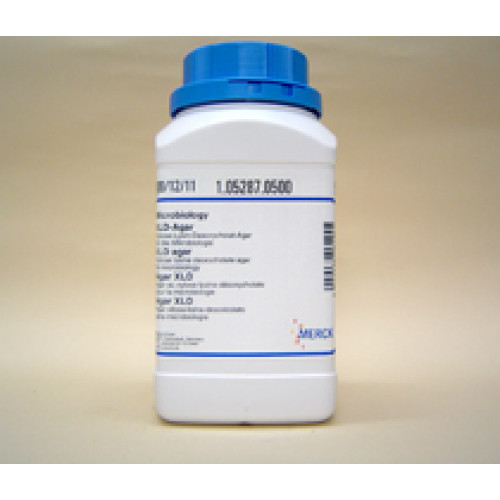ÁGAR XLD GRANULADO - 500G
Modelo: 1052870500
-
R$807,83
ou até 3x de R$269,28 sem juros
Economize 5% no PIX: R$767,44
ou 3.5% no boleto: R$779,56
Consulte aqui o valor do frete e prazo de entrega
Descrição
XLD (XYLOSE LYSINE DEOXYCHOLATE) AGAR GRANULADO MERCK
RENDIMENTO 55g/l SEGUNDO ISO 6579
This culture medium complies with the recommendations of the ISO 6579.
Mode of Action
Degradation of xylose, lactose and sucrose to acid causes phenol red to change its colour to yellow. Production of hydrogen sulfide is indicated by thiosulfate and iron(III) salt, which react to form a precipitate of black iron sulfide in the colonies. Bacteria which decarboxylate lysine to cadaverine can be recognized by the appearance of a purple colouration around the colonies due to an increase in pH. These reactions can proceed simultaneously or successively, this may cause the pH indicator to exhibit various shades of colour
or it may change its colour from yellow to red on prolonged incubation. The culture medium is weakly inhibitory.
Typical Composition (g/litre)
Yeast extract 3.0;
sodium chloride 5.0;
D(+)xylose 3.75;
Lactose 7.5;
sucrose 7.5;
L(+)lysine 5.0;
sodium deoxycholate 1.0;
sodium thiosulfate 6.8;
ammonium iron(III) citrate 0.8;
phenol red 0.08;
agar-agar 14.5.
Preparation
1. Weigh out 55 g of XLD Agar.
2. Add 50 ml of demin. water to a flask
3. Transfer 55 g of XLD Agar gently to flask with swirling.
4. Mix thoroughly, add remaining 950 ml demin. water, until completely suspended. Check for lumps. If present repeat mixing.
5. Heat to boiling to dissolve completely.
6. Immediately cool the medium to about 47-50 °C in a waterbath set at this temperature. Agitate flask to cool
rapidly.
7. Pour plates.
8. Dry plates and check for sterility prior to use.
Note: preparation of large volumes, overheating and prolonged storage in water bath (47-50 °C) should be avoided.
Do not autoclave.
pH: 7.4 ± 0.2 at 25 °C.
The plates are clear and red.
Crystalline precipitate of salts may occur. To avoid this, the liquid medium needs to be filtered through a flute-formed filter.
RENDIMENTO 55g/l SEGUNDO ISO 6579
This culture medium complies with the recommendations of the ISO 6579.
Mode of Action
Degradation of xylose, lactose and sucrose to acid causes phenol red to change its colour to yellow. Production of hydrogen sulfide is indicated by thiosulfate and iron(III) salt, which react to form a precipitate of black iron sulfide in the colonies. Bacteria which decarboxylate lysine to cadaverine can be recognized by the appearance of a purple colouration around the colonies due to an increase in pH. These reactions can proceed simultaneously or successively, this may cause the pH indicator to exhibit various shades of colour
or it may change its colour from yellow to red on prolonged incubation. The culture medium is weakly inhibitory.
Typical Composition (g/litre)
Yeast extract 3.0;
sodium chloride 5.0;
D(+)xylose 3.75;
Lactose 7.5;
sucrose 7.5;
L(+)lysine 5.0;
sodium deoxycholate 1.0;
sodium thiosulfate 6.8;
ammonium iron(III) citrate 0.8;
phenol red 0.08;
agar-agar 14.5.
Preparation
1. Weigh out 55 g of XLD Agar.
2. Add 50 ml of demin. water to a flask
3. Transfer 55 g of XLD Agar gently to flask with swirling.
4. Mix thoroughly, add remaining 950 ml demin. water, until completely suspended. Check for lumps. If present repeat mixing.
5. Heat to boiling to dissolve completely.
6. Immediately cool the medium to about 47-50 °C in a waterbath set at this temperature. Agitate flask to cool
rapidly.
7. Pour plates.
8. Dry plates and check for sterility prior to use.
Note: preparation of large volumes, overheating and prolonged storage in water bath (47-50 °C) should be avoided.
Do not autoclave.
pH: 7.4 ± 0.2 at 25 °C.
The plates are clear and red.
Crystalline precipitate of salts may occur. To avoid this, the liquid medium needs to be filtered through a flute-formed filter.







